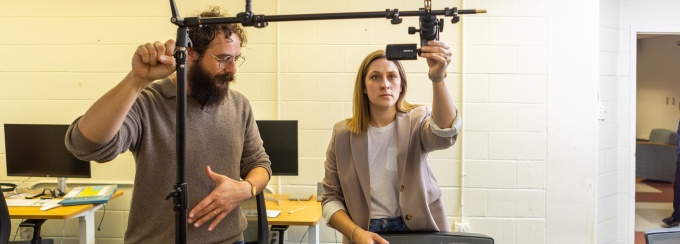Research Labs

The ALN lab focuses on word retrieval in typically aging adults, as well as adults with language impairments due to stroke or neurodegenerative disease.
The lab concentrates its research on the mechanisms of tinnitus and hyperacusis using animal models and on clinical trials involving the use of hearing aids to treat tinnitus. Currently, the team is investigating the effects of cannabis on auditory development as well as a hyperacusis model created by a mutation in the FoxG1 gene.
PI: Prof. Wei Sun
The Auditory Processing and Perception lab investigates the how the biological processes that occur with human development and aging influence speech perception. We also study how those normal lifespan changes interact with hearing loss and other auditory perceptual impairments, to inform improved audiological treatments for people of all ages.
Our lab is interested in how the brain controls the muscles of speech and swallowing and the perceptual, acoustic, kinematic, and neurophysiologic consequences of neurological disease and/or injury on these functions. A current focus is on understanding and improving the measurement of relevant clinical outcomes, such as speech intelligibility, with the ultimate goal of enhancing the care of our patients with oromotor impairments.
The Child Language Lab examines how child and environmental factors influence grammatical development in monolingual and bilingual children with and without communication disorders.
The lab received two grants to evaluate grammatical development in Mandarin-speaking monolinguals and Mandarin-English bilinguals using a picture description task.
CADL studies talk-in-interaction and the interplay between human conversants and their communication technologies, with special attention to individuals with Complex Communication Needs who use Augmentative Communication Technologies to mediate their social interactions.
The Listening Experience Lab combines expertise in audiology, binaural hearing, and listening effort with the goal of improving speech-in-noise listening for individuals with hearing loss.
We study speech impairment and the effects on functional communication in persons with progressive neurological diseases like Parkinson's Disease and Multiple Sclerosis.
The Speech Physiology Laboratory examines how neurological disorders alter speech production and how the body responds to changes associated with neurological diseases during communication. We also study how treatments to improve speech production alter communication outcomes and physiological support for speech production. We are interested in reducing health disparities and increasing healthcare access through the development of devices and computerized tools for assessment and treatment of neurological speech disorders. We collaborate with researchers studying respiratory function during cough and swallow. We collaborate with laboratories at Medical University of South Carolina, Purdue University, Teachers College Columbia University, University of Colorado – Boulder, and Université Laval.
The UB Language Learning Lab conducts research on how elementary school students learn language. We are passionate about making sure that all students, in particular those from culturally and linguistically diverse backgrounds, are getting the help they need to be successful.